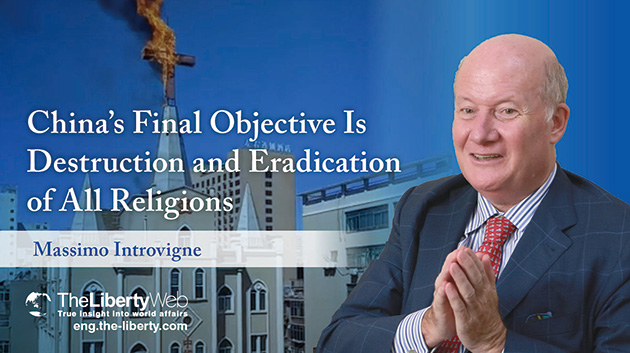China’s Final Objective Is Destruction and Eradication of All Religions
Dr. Massimo Introvigne

Introvigne is an Italian sociologist of religions, and the editor of the daily magazine on religious liberty in China, “Bitter Winter”.
–The Vatican is renewing a two-year-old deal with the CCP that offers the Chinese government a role in appointing Catholic bishops in this country. Could you tell me how this agreement worsens the situation that Catholic devotees face?
Dr. Introvigne: I share the opinion of many other scholars of Chinese religion that the results of the agreement have been negative. On the positive side, as the Vatican noted, there are no longer “schismatic” bishops in China, because all the Catholic Bishops affiliated with the Communist-run Chinese Patriotic Catholic Association (CPCA) are now recognized by the Holy See. The Vatican has also suggested that all bishops, priests, and laypersons affiliate with the CPCA, but has also explained that those who refuse for reasons of conscience to do so are not “rebels,” are still part of the Catholic Church, and has asked the Chinese Communist authorities to “respect” them. In fact, however, these conscientious objectors are not respected, but thrown into jail. It is also the case that the Catholic Church in China is losing members, as many Catholics see it as too much aligned with the regime and do not like it.
My opinion comes however with a nuance. I am familiar enough with the Vatican diplomacy to understand that they care less about what happens in two or even five or ten years. The officers in the Vatican are not elected and they do not have to answer to voters. So they can allow themselves the luxury to think in terms of several decades or even several centuries from now. Their problem is not what effect the agreement has had in two years or will have in the next two years but what possible effect it will have in fifty, hundred or two hundred years. They understand that in the short run the effects have been negative but hope they will be different in the long or very long run.
–Also, the Vatican denied a request from Mike Pompeo for an audience with Pope Francis, and accused the Secretary of State of trying to drag the Catholic Church into the U.S. presidential election by denouncing its relations with China. Could you share your view with us on this issue?
Dr. Introvigne: Many international media do not understand Pope Francis. He became a priest later in life after having spent his youth as a political militant in the populist Peronist party in Argentina. This party can be called either right-wing for some aspects or left-wing for some other aspects, but its main feature is the hate for the United States. Even after he became a priest and a bishop, the future Pope Francis continued to make very hostile remarks on the United States. He is of a certain school of thought in Latin America that likes to say that Latin Americans and the United States are “good neighbors, in the sense that we, the Latin Americans, are good, and they, the Americans from the U.S., are unfortunately neighbors.”
If one does not understand this deep anti-American background of Francis, one makes mistakes of interpretation. He believes that the hegemonic power of the United States is a disgrace for the world and everything damaging it, even Communist China, in a certain way is good for the world.
–In China, even the content of the Bible was distorted to the extent that Mary Magdalen was stoned by Jesus Christ. Sinicization of Christianity has been going on for a long time, but this level of Sinicization is a decisive break from the past wrongdoing and would be a serious blow to the Christians in China for their innermost belief would be hurt. What are your thoughts on this?
Dr. Introvigne: There is little doubt that, since the end of the Cultural Revolution, China with Xi Jinping is going through the most anti-religious period of its history. Sinicization is just a passage, the final objective is destruction and eradication of all religions. Even the state-controlled religion lives a precarious existence.
–In China, the State, i.e. government, maintains a higher existence than churches. However, in democratic countries churches have a higher authority than secular institutions such as government. What are your thoughts of China’s view on the state and church?
Dr. Introvigne: Ultimately, the religion of China is Communism as interpreted by Xi Jinping. There is no god higher than Xi Jinping. Religion is regarded as a temporary annoyance. It will disappear when Xi Jinping’s Socialism with Chinese characteristics will be fully understood and implemented.
–The Vatican has softened its policy toward China within this decade. I was wondering what made the Vatican do so.
Dr. Introvigne: The alternative for the Vatican was to have a Chinese Church totally underground and persecuted or to compromise. It took the second way. They rely on their experience in Vietnam and believe that, by surviving in a situation of compromise, the Catholic Church may slowly open more spaces to breath and live. As I mentioned, they expect results in decades or centuries, not years. I am not sure of the results, as Vietnam is different from China.
–In Japan many people tend to mock faith in God. Could you tell us your view about the meaning and power of faith?
Dr. Introvigne: Faith comes and goes. The death of God is periodically announced and then in the next decade media talk of the “return of God” and the “danger of fundamentalism.” Religion will never go away but it can change, some old religions may shrink, and new forms of religion may grow.



















